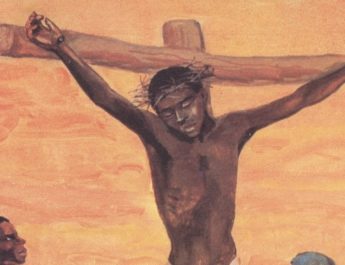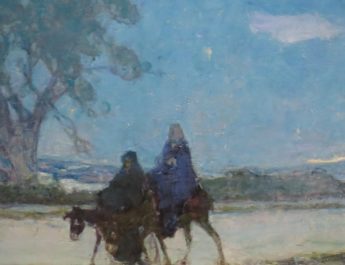Psalm 105:1-11, 45b
Proper 12A
1 O give thanksA to the Lord;B callC on his name;D
A “give thanks” = yadah. From yad (hand). This is to throw one’s hands into the air in a gesture of praise. So, it is to praise, give thanks, or make a confession.
B “Lord” = YHVH. From havah (to be, become) or hayah (to come to pass, become, be). This is the name of the God of Israel, the self-existent and eternal one, the tetragrammaton. This pronunciation has been lost to time so “Lord” is generally used in its place.
C “call” = qara. This is to call or call out – to call someone by name. Also used more broadly for calling forth.
D “name” = shem. May be from sum (to put, place, set). This is name, fame, renown. A name was thought to indicate something essential about a person – something about their individuality. So, this word can also mean honor, authority, or character.
make knownE his deedsF among the peoples.G
E “make known” = yada. This is to know, acknowledge, advise, answer, be aware, be acquainted with. Properly, this is to figure something out by seeing. It includes ideas of observation, recognition, and care about something. It can be used causatively for instruction, designation, and punishment.
F “deeds” = alilah. From alal (to affect, do, practice, mock, overdo, glean, abuse, pain). This is a deed or action – something that causes an effect. It could be a wanton or shameful deed or an opportunity.
G “peoples” = am. From amam (to darken, hide, associate; creating shadows by huddling together). This is people or nation. It can be used specifically for a tribe, collectively of troops or armies, or figuratively to refer to a flock of animals.
2 SingH to him, sing praisesI to him;
tellJ of allK his wonderful works.L
H “sing” = shir. From shir (song, singer). This is to sing. It could also refer to one who is singing or leading others in song.
I “sing praises” = zamar. Perhaps from zamar (to trim or prune). This is making music. It is used specially of music to worship God. So, music with singing, singing praise, or singing psalms.
J “tell” = siach. From siach (musing, meditation, communication, babbling, prayer, contemplation). This is to muse, meditate, complain, sing, sigh, speak, or utter.
K “all” = kol. From kalal (to complete). This is all or every.
L “wonderful works” = pala. From pele (wonder, miracle, wonderful, marvelous thing). This is to be extraordinary, to arise, to be great or accomplish.
3 GloryM in his holyN name;
let the heartsO of those who seekP the Lord rejoice.Q
M “glory” = halal. This is to be clear – it originally referred to a sound, then a color. It was to shine and then make a show or boast then to rave. In a causative sense it came to mean celebrate, give glory, sing praise, or be worth of praise. Because of the celebratory nature of the word, it could also mean to give in marriage. This is where Hallelujah comes from.
N “holy” = qodesh. This is set apart and so sacred. God is different from us and so God is holy/set apart. Things we dedicate to God’s service are set apart for God and so they, too, are holy, etc.
O “hearts” = leb. May be related to labab (to encourage; properly, to be encased as with fat; used in a good sense, this means to transport someone with love; used in a bad sense, it can mean to dull one’s senses). This is the heart, courage, one’s inner self, the mind, or the will. Heart is only used in a figurative sense in the Old and New Testaments.
P “seek” = baqash. This is to seek, ask, desire, or request. It can be any kind of searching. It can also mean to worship or pray – implies a striving for.
Q “rejoice” = samach. This is to rejoice or be glad. Properly, it is to brighten up in a literal or figurative sense.
4 SeekR the Lord and his strength;S
seekT his presenceU continually.V
R “seek” = darash. This is seek, ask, inquire, care for. Generally it means following in pursuit or following as part of a search, which implies seeking or asking. Also used specially to mean worship.
S “strength” = oz. From azaz (to be strong, become fixed, be bold, prevail, be impudent; it means to be stout literally or figuratively. A Late Hebrew word). This is strength in the sense of force, majesty, praise, material and physical strength, the abstract notion of security. It can also speak of social or political power.
T “seek” = baqash. Same as “seek” in v3. See note P above.
U “presence” = paneh. From panah (to turn, face, appear). This is face in a literal or figurative sense. It could be face, presence, anger, respect. It can also be used of God to indicate divine favor or presence.
V “continually” = tamid. May come from a word that means to stretch. This word means an indefinite period of time. So, it could be regular or daily. It could also be constantly, continually, always, or perpetually.
5 RememberW the wonderful works he has done,X
his miraclesY and the judgmentsZ he has uttered,AA
W “remember” = zakar. This is to remember, to mark something so that it can be recalled, to be mindful of, to mention.
X “done” = asah. This is to make, do, act, appoint, become in many senses.
Y “miracles” = mopheth. Perhaps from yaphah (to be beautiful, decorate; root means being bright, which implies being beautiful). This is a wonder, miracle, symbol, sign, or omen.
Z “judgments” = mishpat. From shaphat (to judge, defend, pronounce judgment, condemn, govern). This is a verdict or formal sentence whether from humans or from God. It includes the act of judging as well as the place that judging takes place, the suit itself, and the penalty. Abstractly, this is justice, which includes the rights of the participants.
AA “uttered” = peh. Literally, “of his mouth.” This is mouth in a literal or figurative sense. So, more literally, it can be beak or jaws. More figuratively, it refers to speech, commands, or promises.
6 O offspringBB of his servantCC Abraham,DD
BB “offspring” = zera. From zara (to sow or scatter seed; conceive or yield). This is seed or sowing. It can, thus, mean a fruit, plant, sowing time, child, offspring, or posterity.
CC “servant” = ebed. From abad (to work, serve, compel; any kind of work; used causatively, can mean to enslave or keep in bondage). This is a servant, slave, or bondservant.
DD “Abraham” = Abraham. From the same as Abiram (exalted father, a high father – lofty) {from ab (father literal or figurative) + rum (rise, bring up, being high, extol, exalt, haughty; to raise in a literal or figurative sense)}. This is Abraham, father of many nations or father of a multitude.
childrenEE of Jacob,FF his chosen ones.GG
7 He is the Lord our God;HH
his judgments are in all the earth.II
EE “children” = ben. From banah (to build or obtain children). This is son, age, child. It is son in a literal or figurative sense.
FF “Jacob” = Yaaqob. From the same as aqeb (heel, hind part, hoof, rear guard of an army, one who lies in wait, usurper). This is Isaac’s son and his descendants. The name means heel-catcher or supplanter.
GG “chosen ones” = bachir. From bachar (to choose, appoint, try, excellent). This is chosen or choice. So, it implies excellence.
HH “God” = Elohim.
II “earth” = erets. Root may mean to be firm. This is earth, ground, field land, or country.
8 He is mindfulJJ of his covenantKK forever,LL
JJ “is mindful” = zakar. Same as “remember” in v5. See note W above.
KK “covenant” = berit. Perhaps from barah (to eat, choose, make clear); perhaps from bar (grain, wheat); from barar (to select, purify, cleanse, test, brighten, polish). This is a compact, covenant, alliance, treaty, or league.
LL “forever” = olam. This is a long scope of time whether in the past (antiquity, ancient time) or in the future (eternal, everlasting).
of the wordMM that he commandedNN for a thousandOO generations,PP
MM “word” = dabar. From dabar (to speak, declare, discuss). This is speech, a word, a matter, an affair, charge, command, message, promise, purpose, report, request. It is a word, which implies things that are spoken of in a wide sense.
NN “commanded” = tsavah. This is to charge, command, order, appoint, or enjoin. This is the root that the Hebrew word for “commandment” comes from (mitsvah).
OO “thousand” = eleph. Perhaps from the same as eleph (herd, cattle); from alaph (to learn, speak, associate with). This is thousand.
PP “generations” = dor. From dur (to move in a circle, which implies living somewhere or remaining there; it can also be the sense of piling or heaping up). This is a revolution of time, which is to say, an age or generation. It can also be a dwelling or one’s posterity.
9 the covenant that he madeQQ with Abraham,
his sworn promiseRR to Isaac,SS
QQ “made” = karat. This is to cut down, cut off, or make a covenant (idiom for making a covenant is “to cut a covenant”). It can also mean to destroy, fail, or consume.
RR “sworn promise” = shebuah. From sheba (seven – the number of perfection/sacred fullness); from shaba (to swear, curse, vow, make a covenant; properly, to be complete; this is to seven oneself – as in affirming something so strongly it is as though it were said seven times). This is oath or curse.
SS “Isaac” = Yischaq. 4x in OT. From tsachaq (to laugh, mock, play, make sport; this is laughing out loud whether in joy or in a scornful way) OR from shachtsom (Shachtsom, Shahazumah, or Shahazimah – a city; proudly); from the same as shachats (pride, dignity, lion; a haughty attitude; root may mean to strut). This is Isaac, meaning “he laughs.” This is Isaac, meaning “he will laugh.”
10 which he confirmedTT to Jacob as a statute,UU
to IsraelVV as an everlastingWW covenant,
TT “confirmed” = amad. This is to stand up in a literal or figurative sense. So it can be establish, continue, endure, take a stand, act, be a servant, stand still, remain, stand against an enemy.
UU “statute” = choq. From chaqaq (to inscribe, carve, or decree; a lawmaker; literally, this is engraving, but it implies enacting a law because laws were carved into stone or metal). This is statute, boundary, condition, custom, limit, ordinance It is something that is prescribed or something that is owed.
VV “Israel” = Yisrael. Related to “God” in v7. From sarah (to persist, exert oneself, contend, persevere, wrestle, prevail) + El (see note HH above). This is Israel, meaning God strives or one who strives with God; new name for Jacob and for his offspring. This refers to the people and to the land.
WW “everlasting” = olam. Same as “forever” in v8. See note LL above.
11 saying, “To you I will giveXX the landYY of CanaanZZ
as your portionAAA for an inheritance.”BBB
XX “give” = natan. This is to give, put, set, offer. It is to give literally or figuratively.
YY “land” = erets. Same as “earth” in v7. See note II above.
ZZ “Canaan” = Kna’an. From kana’ (to be humble, subdue; properly, bend the knee). This is Canaan, his descendants, and the land where they settled. This could mean lowlands, describing their land or subjugated in reference to being conquered by Egypt. See https://en.wikipedia.org/wiki/Canaan
AAA “portion” = chebel. From chabal (to bind, pledge, or wind tight; figuratively, can refer to perverting or destroying something; can also be used of writhing in pain, particularly in reference to childbirth). This is a band, rope, measuring line, noose. It can be a company, territory, or country. It can also refer to a throe of labor or ruin.
BBB “inheritance” = nachalah. From nachalah (properly something that was inherited; can mean occupancy generally or, more particularly, an heirloom or an estate; can be an inheritance, gift, possession, or portion). This is to gain as a possession, divide for inheritance. Also, to occupy for any reason.
45 thatCCC they might keepDDD his statutes
and observeEEE his laws.FFF
PraiseGGG the Lord!HHH
CCC “that” = abur. From abar (to pass over, pass through, or pass by; cross over or to alienate; used for transitions). This is for, so that, on account of. Properly, it means crossed.
DDD “keep” = shamar. This is to keep, watch, or preserve. It means to guard something or to protect it as a thorny hedge protects something.
EEE “observe” = natsar. This is to watch, guard, protect. It can be positive – preserve or obey. It can be negative as conceal.
FFF “laws” = torah. From yarah (to throw, shoot, be stunned; to flow as water so figuratively to instruct or teach). This is law, instruction, teaching, or statute. It can also refer to the first five books of the Bible – the Torah.
GGG “praise” = halal. Same as “glory” in v3. See note M above.
HHH “Lord” = Yah. Related to “Lord” in v1. From YHVH (see note B above). This is Lord or God – a shortened form of God’s most holy name.
Image credit: “Happy Camel” by Ryan Overeem, 2011.




